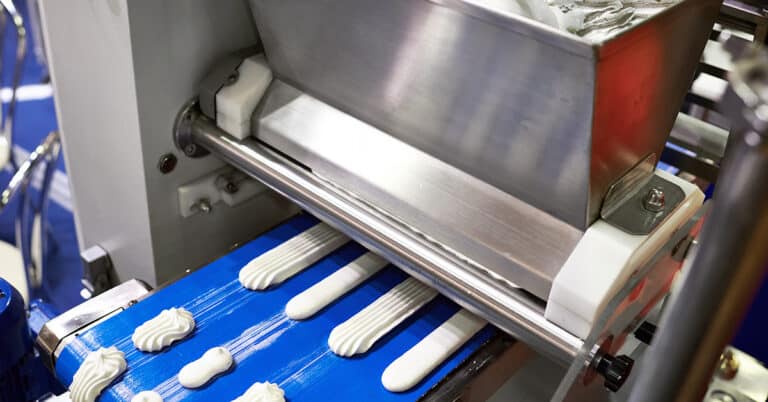Blockchain technology has far-reaching implications, beyond the cryptocurrency applications with which it is most associated. Blockchain in the manufacturing industry, for example, offers numerous benefits, from supply chain monitoring to track and trace applications and beyond. In this article, we will explore what exactly blockchain is and how it can apply to manufacturing and industrial applications.
What is blockchain technology?
Blockchain technology is a unique data storage mechanism using a public ledger to keep track of information. As the name indicates, blockchain can be thought of as two primary concepts:
- The “block” — A unit of information or data
- The “chain” — The collection of blocks, each linked to the previous one, that comprises the blockchain
There are several unique qualities of blockchain that form the foundation of the promise and potential that this technology offers. These include:
- Public, decentralized tracking: The blockchain is public and visible to anyone and is not subject to control by a third party.
- A permanent, immutable record: Once a block is entered into the chain, it becomes permanent. Unlike other types of databases that can be updated and changed over time, a blockchain offers a view of the entire history of the chain since data can only be added (in the form of a new block), not changed.
With these underpinnings in mind, we can now look at the application of blockchain technology in the manufacturing industry.
Blockchain industrial applications
Blockchain in the manufacturing industry can be considered an application of Industry 4.0 with its use of data and connectivity to improve the performance, efficiency and productivity of today’s industrial facility. With the vast amount of data collected and used in Industry 4.0 —gathered from equipment sensors, used by suppliers and distributors and monitored for quality assurance and tracking — blockchain is a natural fit as a powerful data sharing, tracking and shielding solution for industrial companies.
Blockchain’s ability to rapidly share, track and analyze information for data-driven manufacturers can be useful for the following industrial applications:
- Supply chain monitoring: The increased visibility and accuracy of blockchain make it an excellent tool for supply chain monitoring. With its distributed, decentralized nature, the chain is visible to both the supplier and the purchaser, helping to create natural efficiencies in ordering. In addition, blockchain can be valuable as a tool for tracking fulfillment, quality and overall supplier performance, enabling more reliable supplier assessments and, ultimately, an improvement in forecasting and meeting delivery dates.
- Sharing engineering specifications: Sharing engineering specifications through the distributed chain ensures a single source of truth for anyone who needs access to that information.
- Identity management: It is an unfortunate reality that the risk of counterfeit credentials is one that manufacturers must be wary of on an everyday basis. With blockchain, facility managers can much more easily and reliably confirm the identities and credentials of auditors, engineers, technicians, contractors and other personnel who access the facility, ensuring security and peace of mind.
- Identify and disrupt counterfeit parts/assets: Counterfeit parts and assets are rampant issues in the supply chain and ones that may be reduced or eliminated through the widespread adoption of blockchain. By entering and reviewing part ID numbers as blocks into the chain, suppliers and customers upstream and downstream can be assured that they are receiving genuine parts as provided by OEMs and distributors.
- Asset tracking: The blockchain can serve as a useful tool for asset performance and usage tracking, replacing standard databases or spreadsheets and ensuring a higher level of reliability and accuracy. The immutable nature of the blockchain means that the entire performance history of a machine can be available at a glance, with 100% accuracy assurance.
- Quality assurance: Blockchain for factories holds great potential in quality assurance, for example, by drawing upon individual part data entered into the chain during the production process to more accurately make quality assessments. In addition, quality tracking can be effectively accomplished by entering outgoing piece data into the chain.
Blockchain in manufacturing
Blockchain has the potential to increase data visibility within and outside the walls of manufacturing facilities. Every step of the manufacturing process, for instance, can be shared, monitored and analyzed in real-time. From suppliers to strategic sourcing, procurement, shop floor operations, machine monitoring, machine maintenance and service and more, blockchain can open up pathways in line with smart manufacturing trends.
Blockchain may further enhance manufacturing/maintenance processes in these areas:
- Improving the ability to track and trace data with guaranteed accuracy and security: Data accuracy is critical for developing reliable benchmarks and goals for equipment accuracy and maintenance targets. With the blockchain, facilities can be confident that data is being accurately tracked and that the data found in the chain is reliable.
- Protecting and monetizing intellectual property: Should conflicts regarding IP arise, the blockchain can protect owners by enabling referral to time stamped, immutable data that is guaranteed to be accurate.
- Supporting and enhancing maintenance strategies: By entering data collected from industrial sensors into the blockchain, facilities can more easily share and analyze that information to enable more accurate and effective maintenance practices, including predictive maintenance and machine-driven maintenance. The potential of blockchain technology in this area is vast because so much data is collected through equipment sensors and we are still identifying the most effective ways to use it.
Best practices for adopting blockchain in manufacturing
Blockchain represents uncharted territory for many manufacturers, and it can be challenging to start the conversation to implement blockchain in a facility. Some ideas for initiating discussion include:
- Make the business case: Present blockchain as another way to improve business processes and embrace the future of interconnected enterprise technology in Industry 4.0 and building a “smart factory.” Mention that competitors are also aware of blockchain and are likely to begin implementing it as well, so your facility’s adoption may be necessary to maintain a competitive edge.
- Build an ecosystem that makes sense and is positively impactful: Although blockchain implementation may be cumbersome at first, it is better to go into it with a big-picture, long-term plans and goals, rather than a piecemeal implementation that may become more difficult to scale and maintain — and, ultimately, may yield fewer benefits.
- Design the blockchain system deliberately: Identify objectives, confront risks early, consider privacy applications and invest in data, processes and personnel.
- Consider how implementing blockchain technology will intersect with industry regulatory practices and standards: While there are many potential benefits in this area, it is also important to ensure that any tracking or record keeping via blockchain will remain compliant with your relevant regulations.
With this understanding of the blockchain and its potential impact on manufacturing, you are poised to begin the conversation at your facility, with a host of possible benefits in hand. You are also well equipped to take action should your competitors begin implementing blockchain so that you will not be caught unaware. As with any quickly evolving field, early adoption offers benefits as well as risks, and you now have an understanding of both.






